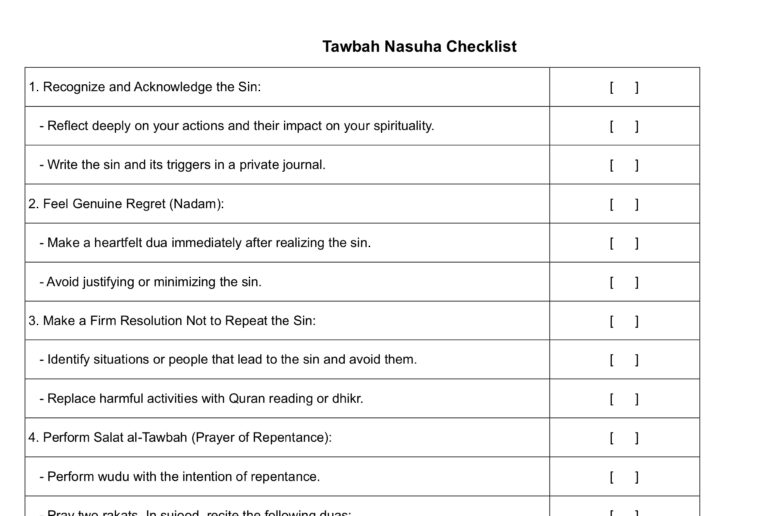Seeking forgiveness in Islam: Major sins, Tawbah and Becoming a Better Muslim
As Muslims, we all make mistakes. Life is a constant journey of learning, growing, and seeking Allah’s forgiveness. But how do we genuinely repent for our sins in Islam? Are all sins forgivable? What is the process of tawbah, and how can it help us become better Muslims? If you’ve ever asked these questions this guide is for you.
What Are Major Sins in Islam?
Major sins are grave actions explicitly mentioned in the Quran or Hadith, such as associating partners with Allah (shirk), committing murder, or engaging in riba (interest).
70 Major Sins:
A list of 70 Major sins as seen in Imam Adh-Dhahabi’s Al-Kaba’ir , a widely referenced book used in Islamic education to teaching major sins in Islam, supported by evidence from the Quran and authentic Hadith.
- Shirk (Associating partners with Allah) (Surah An-Nisa, 4:48)
- Killing without just cause (Surah Al-Isra, 17:33)
- Practicing sorcery or magic (Surah Al-Baqarah, 2:102)
- Not performing Salah (prayer) (Surah Maryam, 19:59)
- Not paying Zakat (Surah At-Tawbah, 9:34-35)
- Not fasting during Ramadan without a valid excuse (Sahih Bukhari)
- Not performing Hajj despite having the means (Surah Al-Imran, 3:97)
- Disrespecting parents (Surah Luqman, 31:14)
- Severing ties of kinship (Surah Muhammad, 47:22)
- Committing Zina (adultery or fornication) (Surah Al-Isra, 17:32)
- Engaging in homosexuality (Tirmidhi)
- Consuming Riba (usury or interest) (Surah Al-Baqarah, 2:275)
- Wrongfully consuming orphans’ wealth (Surah An-Nisa, 4:10)
- Lying about Allah and His Messenger (Surah Az-Zumar, 39:32)
- Fleeing from the battlefield (Sahih Bukhari and Sahih Muslim)
- A leader who deceives their people (Sahih Muslim)
- Pride, arrogance, and self-conceit (Surah An-Nahl, 16:23)
- Bearing false witness (Surah An-Nur, 24:4)
- Consuming alcohol (Surah Al-Ma’idah, 5:90)
- Gambling (Surah Al-Ma’idah, 5:90)
- Theft (Surah Al-Ma’idah, 5:38)
- Robbery or highway robbery (Surah Al-Ma’idah, 5:33)
- Bribery (Surah Al-Baqarah, 2:188)
- A woman’s disobedience to her husband without valid reason (Sahih Bukhari)
- Killing an unborn child (abortion without valid reason) (Surah Al-Isra, 17:31)
- Practicing fortune-telling or astrology (Sahih Muslim)
- False oaths (perjury) (Surah An-Nahl, 16:94)
- Oppression and unjust leadership (Surah Hud, 11:113)
- Stealing spoils of war or public property (Surah Al-Imran, 3:161)
- Wrongfully accusing someone of Zina (Surah An-Nur, 24:4)
- Using pictures or idols for worship (Sahih Muslim)
- Complaining about Allah’s decree (Surah Al-Baqarah, 2:216)
- Harming others with foul language (Sahih Muslim)
- Misleading others in religious matters (Surah Al-Baqarah, 2:159)
- Cheating in business transactions (Surah Al-Mutaffifin, 83:1)
- Spying or eavesdropping on others (Surah Al-Hujurat, 49:12)
- Backbiting (Surah Al-Hujurat, 49:12)
- Mocking or ridiculing others (Surah Al-Hujurat, 49:11)
- Causing harm to neighbors (Sahih Bukhari, Hadith 6016)
- Excessive mourning for the dead (wailing) (Sahih Bukhari)
- Disobeying just authority (Sahih Muslim)
- Breaking promises and covenants (Surah Al-Isra, 17:34)
- Denying predestination (Qadar) (Surah Al-Qamar, 54:49)
- Favoritism in giving to children (Sahih Bukhari)
- Harming animals unjustly (Sahih Bukhari)
- Withholding knowledge when needed (Surah Al-Baqarah, 2:159)
- Misusing positions of power for personal gain (Surah Al-Baqarah, 2:188)
- Hoards wealth without giving in charity (Surah Al-Humazah, 104:2-3)
- Deliberately delaying debts (Sahih Bukhari)
- Abandoning the Quran and its recitation (Surah Al-Furqan, 25:30)
- Envying others (Surah An-Nisa, 4:54)
- Mocking Allah’s verses (Surah At-Tawbah, 9:65-66)
- Favoring wealth over fulfilling religious duties (Surah Al-Tawbah, 9:34)
- Unjustified divorce (Surah Al-Baqarah, 2:231)
- Unjust treatment of wives (Surah An-Nisa, 4:19)
- Abandoning Friday prayers without excuse (Sahih Muslim)
- Prolonged grief without reliance on Allah (Sahih Bukhari)
- Rejecting a Muslim’s greeting without reason (Sahih Muslim)
- Unnecessary extravagance or wastefulness (Surah Al-Isra, 17:27)
- Turning away from those seeking help (Surah Abasa, 80:10-11)
- False claims of prophecy (Surah Al-Ahzab, 33:40)
- Fabricating Hadith or attributing false sayings to the Prophet (Sahih Bukhari)
- Falsifying lineage (Sahih Muslim)
- Disrespecting the Kaaba or sacred sites (Surah Al-Hajj, 22:32)
- Betraying trusts or public responsibilities (Surah Al-Anfal, 8:27)
- Withholding water or resources from others (Sunan Abi Dawood)
- Desecrating the Quran (e.g., by throwing it or treating it disrespectfully) (Surah Al-Hajj, 22:30)
- Spreading innovations in religion (Bid’ah) (Sunan Ibn Majah)
- Failing to protect one’s private parts (modesty) (Surah Al-Mu’minun, 23:5-7)
- Encouraging others to sin or disobedience (Surah Al-An’am, 6:116)
Al Kabair is a book that explores the spiritual, social, and moral consequences of major sins, organized into themes such as sins against Allah, sins against others, and societal harms. It also provides a practical guide to help Muslims avoid these grave transgressions and strengthen their faith.
Shirk: The Biggest Sin in Islam
Shirk, or associating partners with Allah, is the most severe sin in Islam because it violates the core principle of Tawhid (the oneness of Allah). Shirk can take many forms, both obvious and subtle, and it leads to spiritual ruin if not repented for sincerely.
Examples of Shirk
Here are some clear, common and also most overlooked forms of shirk we must avoid.
- Worshiping idols or statues (Surah Al-Baqarah 2:165)
- Believing in multiple gods or associating others with Allah in divinity (Surah An-Nisa 4:48)
- Supplicating to saints, the dead, or anyone other than Allah (Surah Al-Jinn 72:18)
- Believing that any being other than Allah has independent control over the universe (Surah Yunus 10:31)
- Performing acts of worship to gain admiration (riya) (Musnad Ahmad 23119)
- Swearing by someone or something other than Allah, such as “I swear on my mother’s life” (Abu Dawood 3251)
- Believing in superstitions like charms, amulets, or horoscopes as having power (Surah An-Naml 27:65)
- Seeking blessings from objects or places, believing they bring good fortune (Surah Al-Baqarah 2:186)
- Over-relying on material means like wealth or medicine as independent of Allah’s will (Surah Hud 11:6)
- Loving someone, such as a spouse or leader, to a level that surpasses love for Allah (Surah Al-Baqarah 2:165, Sahih Bukhari 15)
- Consulting astrology or horoscopes and believing they control destiny (Surah Al-Jinn 72:26-27)
- Attributing natural events like rain to other than Allah’s control (Surah Al-Waqiah 56:68-70)
How to Seek Forgiveness from Allah for Major sins?
“Do not despair of the mercy of Allah. Indeed, Allah forgives all sins.” (39:53)
Unlike minor sins, Major sins require a deliberate and sincere process of repentance (tawbah) that goes beyond verbal requests for forgiveness. Islamic scholars have defined specific steps and conditions for sincere repentance (tawbah nasuha), drawing from the Quran and authentic Hadith.
Practical Steps for Tawbah Nasuha – Sincere Repentance
As narrated in Kitab al-Tawbah by Al-Ghazali
1. Recognise and Acknowledge the Sin
Repentance begins with awareness. You cannot repent from something you don’t acknowledge.
1. Identify Your Sin: Imam Al-Ghazali emphasizes that true Tawbah starts with self-awareness (muhasaba), where you reflect on how the sin has harmed your soul and weakened your faith.
2. Recognize the Impact: Think about the consequences of the sin—on your relationship with Allah, your spirituality, and possibly others. For example: Missing Salah distances you from Allah and deprives you of His blessings.
3. Internalize the Quran’s Warning:
“But as for he who transgressed and preferred the life of the world, then indeed, Hellfire will be [his] refuge.” (Surah An-Nazi’at 79:37-39)
This step inspires genuine regret, which is the foundation of repentance.
2. Feel Genuine Regret (Nadam)
he Prophet Muhammad ﷺ said:
“Regret is repentance.” (Sunan Ibn Majah 4252)
1. Understand the Spiritual Consequences: Imam Al-Ghazali likens regret to the pain of a wound—it is a necessary discomfort that pushes you toward healing. Think about how the sin affected your heart. Do you feel distant from Allah?
2. Cry Out to Allah: Let your emotions surface when you make dua. Regret should feel like a heartfelt acknowledgment of your shortcomings. The Prophet ﷺ often cried during dua, saying:
“O Allah, forgive me, for I am weak and in need of Your mercy.”
3. Make a Firm Resolution Not to Repeat the Sin
1. Renew Your Intentions: Make a firm intention (niyyah) to avoid the sin at all costs. Imam Al-Ghazali explains that a key sign of sincere repentance is a strong resolve to reform one’s behavior.
2. Take Preventative Measures: Identify triggers that led you to sin and actively remove them from your environment. For example, if backbiting happens in a specific social circle, distance yourself from those gatherings. Or if wasting time leads to sins, schedule productive activities during idle hours.
3. Rely on Allah for Strength: Recite this powerful dua:
“O Allah, guide me to what pleases You and distance me from what displeases You.”
4. Perform Salat al-Tawbah (Prayer of Repentance) and Make Dua
This is the most direct action of repentance, as recommended by the Prophet Muhammad ﷺ.
1. How to Perform Salat al-Tawba
Make wudhu and Pray Two Rakat.
Recite Surah Al-Fatiha and any other surah in both rakats. Make sujood (prostration) longer than usual, pouring your heart out to Allah.
2. 4 Duas for Repentance
Supplicate After Salah to seek forgiveness from Allah:
1. Sayyidul Istighfar
This is regarded as the master dua for seeking forgiveness.
اللَّهُمَّ أَنْتَ رَبِّي لَا إِلَهَ إِلَّا أَنْتَ خَلَقْتَنِي وَأَنَا عَبْدُكَ وَأَنَا عَلَى عَهْدِكَ وَوَعْدِكَ مَا اسْتَطَعْتُ أَعُوذُ بِكَ مِنْ شَرِّ مَا صَنَعْتُ أَبُوءُ لَكَ بِنِعْمَتِكَ عَلَيَّ وَأَبُوءُ بِذَنْبِي فَاغْفِرْ لِي فَإِنَّهُ لَا يَغْفِرُ الذُّنُوبَ إِلَّا أَنْتَ
“O Allah, You are my Lord. None has the right to be worshipped but You. You created me, and I am Your servant. I am steadfast in Your covenant and promise to the best of my ability. I seek refuge in You from the evil I have done. I acknowledge Your favor upon me, and I acknowledge my sin. So forgive me, for verily none forgives sins except You.”
2. Dua of Prophet Yunus (AS)
This dua was recited by Prophet Yunus (AS) in the belly of the whale, and it is one of the most powerful supplications for forgiveness.
لَا إِلَهَ إِلَّا أَنْتَ سُبْحَانَكَ إِنِّي كُنْتُ مِنَ الظَّالِمِينَ
“There is no deity except You; exalted are You. Indeed, I have been of the wrongdoers.” (Surah Al-Anbiya 21:87)
3. Dua of Prophet Adam (AS)
This is the supplication of Prophet Adam (AS) and Hawa (AS) when they sought forgiveness after eating from the forbidden tree.
رَبَّنَا ظَلَمْنَا أَنْفُسَنَا وَإِنْ لَمْ تَغْفِرْ لَنَا وَتَرْحَمْنَا لَنَكُونَنَّ مِنَ الْخَاسِرِينَ
“Our Lord, we have wronged ourselves, and if You do not forgive us and have mercy upon us, we will surely be among the losers.” (Surah Al-A’raf 7:23)
4. General Istighfar (Seeking Forgiveness)
أَسْتَغْفِرُ اللَّهَ وَأَتُوبُ إِلَيْهِ
“I seek forgiveness from Allah and turn to Him in repentance.”
5. Follow Up with Good Deeds
Allah says:
“Indeed, good deeds do away with misdeeds.” (Surah Hud 11:114)
Replace Bad Actions with Good Ones: If you wronged someone, make amends by apologizing or compensating them. If the sin was neglecting your duties to Allah (e.g., missing Salah), perform voluntary prayers (e.g., Sunnah and Tahajjud).
Give Charity: Imam Al-Ghazali emphasizes charity as a practical way to seek forgiveness, as it benefits others and purifies your soul.
6. Make Amends if You Have Harmed Others
“Whoever has wronged his brother, let him seek forgiveness before the Day when there will be no dinar or dirham.” (Sahih Bukhari 2449)
Ask for Forgiveness Directly: If you’ve backbitten, lied, or caused harm, seek forgiveness from the person involved. Be sincere, and avoid justifying your actions.
Return Stolen or Taken Rights: Return anything that was taken unjustly, whether it’s money, possessions, or a damaged reputation.
7. Maintain Tawbah Through Daily Actions
Daily Dhikr: The Prophet ﷺ said:
“The one who frequently seeks forgiveness, Allah will provide relief from every worry, a way out of every hardship, and provision from where he does not expect.” (Abu Dawood 1518)
أَسْتَغْفِرُ اللَّهَ
Recite Astaghfirullah (I seek forgiveness from Allah) 100 times a day. Use Islamic Apps or reminders to build consistency.
Renew Tawbah Frequently: Imam Al-Ghazali teaches that repentance is a lifelong process. Repeat these steps whenever you fall into error.
Get Your Tawbah Checklist:
How to Seek Forgiveness for Other Sins?
This section explores commonly asked questions like “Is gluttony a sin?” or “Is masturbation a sin?” And whether they are minor sins or major sins (kabair). It also provides actionable steps for seeking forgiveness and stopping harmful habits.
Minor Sins
These are smaller, everyday wrongdoings, such as lying, speaking harshly, or neglecting sunnah prayers. Minor sins are forgiven through regular good deeds and daily acts of worship, such as wudu, salah, and dhikr. Allah says:
“Indeed, good deeds do away with misdeeds.” (Surah Hud 11:114)
Fahisha (Immoral Acts)
Fahisha, or immoral acts, such as fornication, adultery, and pornography, fall into the category of major sins because they are explicit immoral acts that corrupt the heart, mind and may lead to other major sins. Allah warns in the Quran:
“And do not approach immoral deeds [fahisha], whether openly or in secret…” (Surah Al-An’am 6:151)
The Prophet Muhammad ﷺ also said, “The adultery of the eyes is looking [at what is sinful], the adultery of the tongue is speaking, and the soul desires and yearns. The private parts either confirm it or deny it.” (Sahih Bukhari 6243, Sahih Muslim 2658). Scholars like Ibn al-Qayyim and Imam Al-Ghazali affirm that watching inappropriate material, such as pornography, is zina of the eyes, a hidden form of fahisha. It corrupts the heart, weakens modesty, and leads to greater sins, making it essential to guard one’s senses and seek immediate repentance.
5 Most Asked Questions on Sins and Fahisha
1. Is Masturbation Haram?
The majority view across Islamic jurisprudence is that masturbation is haram, except in cases where it prevents greater harm (e.g., zina). Even in such cases, it is considered a lesser evil, not an encouraged action. The minority view (e.g., Hanbali) may classify it as makruh (discouraged) under specific circumstances.
2. Is Gluttony A Sin?
Gluttony, defined as excessive eating or drinking, is considered a minor sin (sagha’ir) in Islam, as it conflicts with the principle of moderation. It is not categorized as a major sin (kabair), but it is highly discouraged due to its harmful effects on physical, spiritual, and social well-being. This classification is based on Quranic verses and scholarly interpretations.
3. Is Zina Forgivable?
Yes, zina (fornication or adultery) is forgivable if one sincerely repents. Allah is All-Merciful and forgives those who turn back to Him with sincerity:
“And those who do not invoke with Allah another deity or kill the soul which Allah has forbidden, except by right, and do not commit unlawful sexual intercourse. And whoever should do that will meet a penalty… Except for those who repent, believe and do righteous work. For them Allah will replace their evil deeds with good. And ever is Allah Forgiving and Merciful.” (Surah Al-Furqan 25:68-70)
4. Is Shirk Forgivable? Can Allah Forgive Shirk?
Shirk (associating partners with Allah) is the gravest sin in Islam and is described as unforgivable if one dies without repenting. Allah says:
“Indeed, Allah does not forgive association with Him, but He forgives anything else for whom He wills. And whoever associates others with Allah has certainly fabricated a tremendous sin.” (Surah An-Nisa 4:48)
However, if someone repents from shirk during their lifetime, Allah’s mercy encompasses all sins, including shirk:“Say, O My servants who have transgressed against themselves [by sinning], do not despair of the mercy of Allah. Indeed, Allah forgives all sins…” (Surah Az-Zumar 39:53)
5. When Is Lying Permissible in Islam?
Lying is generally prohibited in Islam, as truthfulness is a key virtue. The Prophet Muhammad ﷺ said:
“Truthfulness leads to righteousness, and righteousness leads to Paradise. A man continues to tell the truth until he becomes truthful. Falsehood leads to wickedness, and wickedness leads to Hellfire…” (Sahih Bukhari 6094, Sahih Muslim 2607)
However, lying is permissible in specific situations where it prevents harm or promotes greater good, as outlined in Hadith:
1. Reconciliation: To mend relations between people.
“He is not a liar who reconciles between people and conveys something good or says something good.” (Sahih Bukhari 2692, Sahih Muslim 2605)
2. During War: To protect lives or strategy.
3. To One’s Spouse: To maintain harmony in marriage, provided it does not involve deceit that harms trust.
These exceptions must be exercised with caution and sincerity, ensuring they align with Islamic principles.
Becoming a Better Muslim
If you’ve come across this article, it means you’re already on the path toward becoming a better Muslim. Recognizing the need to improve is the first step, and that itself is a sign of faith. Islam teaches us that every believer has room to grow, and it’s not about being perfect but about constantly striving to become better.
We all fall short, make mistakes, and struggle with habits we wish to leave behind. But what matters is the effort to turn back to Allah. His mercy is always greater than our sins, and seeking forgiveness is one of the most beautiful acts of worship. Each sincere prayer, each small good deed, and even each regret over a mistake brings you closer to Him.







